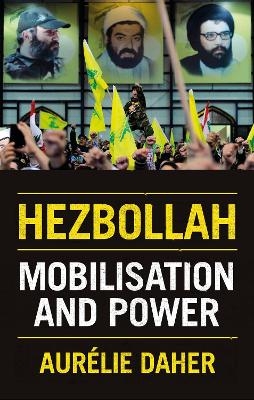
Hezbollah
Mobilisation and Power
Seiten
2024
C Hurst & Co Publishers Ltd (Verlag)
978-1-911723-44-8 (ISBN)
C Hurst & Co Publishers Ltd (Verlag)
978-1-911723-44-8 (ISBN)
Drawing on first-hand interviews with rank and file members of Hezbollah, the author illuminates the inner workings of this Islamist terrorist group.
Almost forty years after its foundation, Hezbollah remains an enigma. Is it an Islamist terrorist group dedicated to destroying Israel or the first Arab national resistance ever to have defeated Tel Aviv’s troops? Should we look at it as a patriotic and respectable party or a fascist network at the centre of Lebanese political life? Hezbollah intrigues all the more for the difficulty involved in studying it. Its weakening, if not demise, has been announced many times since its inception in the early 1980s. But the fact is that Hezbollah has never stopped growing in power, on the national stage as well as in a regional context.
This book has three purposes. It first gives a clear definition of Hezbollah, presenting a thorough history of the party, describing its established internal structure, and the scope of its social and political action. It then explains the evolution of the party’s mobilisation. Finally, it illustrates another path, political but mainly identity-related — that of the Shiite community, today the main constituent of Lebanese society.
This rigorous and richly documented study, drawing on primary sources and hundreds of interviews with members, executives and officials of the party, unveils new aspects of this organisation, of the ‘Hezbollah phenomenon’ and of Lebanese politics at the turn of the twenty-first century.
Almost forty years after its foundation, Hezbollah remains an enigma. Is it an Islamist terrorist group dedicated to destroying Israel or the first Arab national resistance ever to have defeated Tel Aviv’s troops? Should we look at it as a patriotic and respectable party or a fascist network at the centre of Lebanese political life? Hezbollah intrigues all the more for the difficulty involved in studying it. Its weakening, if not demise, has been announced many times since its inception in the early 1980s. But the fact is that Hezbollah has never stopped growing in power, on the national stage as well as in a regional context.
This book has three purposes. It first gives a clear definition of Hezbollah, presenting a thorough history of the party, describing its established internal structure, and the scope of its social and political action. It then explains the evolution of the party’s mobilisation. Finally, it illustrates another path, political but mainly identity-related — that of the Shiite community, today the main constituent of Lebanese society.
This rigorous and richly documented study, drawing on primary sources and hundreds of interviews with members, executives and officials of the party, unveils new aspects of this organisation, of the ‘Hezbollah phenomenon’ and of Lebanese politics at the turn of the twenty-first century.
Aurélie Daher is Associate Professor at Université Paris-Dauphine and at Sciences Po, Paris; a former postdoctoral fellow at the University of Oxford (2010–2011 and 2016–2017); and a former postdoctoral research associate at Princeton University (2012–2013). Her work focuses on Hezbollah, Shiism, and Lebanese and Middle Eastern politics.
| Erscheinungsdatum | 26.04.2024 |
|---|---|
| Verlagsort | London |
| Sprache | englisch |
| Maße | 138 x 216 mm |
| Themenwelt | Geschichte ► Allgemeine Geschichte ► Zeitgeschichte |
| Geisteswissenschaften ► Geschichte ► Regional- / Ländergeschichte | |
| Sozialwissenschaften ► Politik / Verwaltung | |
| ISBN-10 | 1-911723-44-8 / 1911723448 |
| ISBN-13 | 978-1-911723-44-8 / 9781911723448 |
| Zustand | Neuware |
| Haben Sie eine Frage zum Produkt? |
Mehr entdecken
aus dem Bereich
aus dem Bereich
Gewalt, Umwelt, Identität, Methode
Buch | Softcover (2024)
Spector Books OHG (Verlag)
36,00 €
wie Freud im Kollektiv verschwand
Buch | Hardcover (2024)
Klett-Cotta (Verlag)
25,00 €


